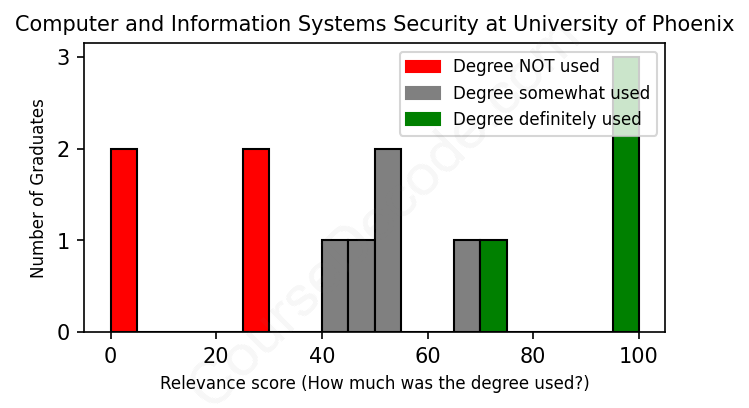
First, some facts. Of the Computer and Information Systems Security graduates from University of Phoenix we've analyzed , here's how many have used (or NOT used) their degree in their career:

These are estimates based on AI analysis of 13 LinkedIn profiles (see below).
The verdict? Significantly below average. Overall, with an average relevance score of 52%, Computer and Information Systems Security graduates from University of Phoenix have a much lower likelihood (-15%) of finding work in this field compared to the average graduate across all fields:
And for comparison, here's the chart for all profiles we've looked at across all degrees.
Also, after graduating, only 23% of these graduates have pursued further education other than another Bachelor's degree (such as a Masters degree or other), compared to the average across all profiles of 35%. This suggests a Bachelors degree is enough for most Computer and Information Systems Security graduates, and it's normal to look for work straight after graduation.
See the details:
|
Relevance score: 70% We think this person has gone into a career only somewhat relevant to their degree. We think this person has gone into a career only somewhat relevant to their degree.
DEGREE INFOGraduated in 2014 from University of Phoenix with a Bachelor of Science (B.S.) in Computer and Information Systems Security. No other secondary education since. JOB HISTORY SINCE GRADUATIONConsumer Product Advisor Microsoft Sep 2014 - Mar 2015 Consumer Services Advisor  Microsoft Mar 2015 - Jul 2020 Education Specialist  Microsoft Jul 2020 - Present ABOUTExperienced technical problem solver looking to pursue new challenges and grow my technical acumen. I strive to provide efficient and effective communication to improve the support process for the end user. Driven by a strong customer obsession and a desire to provide the best user experience. |
The top 10 most common jobs done by the graduates we've analyzed (ranked most common to least) are:
When looking at the types of jobs that people with a degree in Computer and Information Systems Security from the University of Phoenix have taken on, there's a mixed bag of relevance to their field. Some folks land positions like Engineering Specialist or Network Security Engineer, which definitely use the skills they learned in school about cybersecurity and information systems. On the flip side, there are people who end up in jobs that are totally unrelated, like Directional Driller and Mechanic II, showing that not everyone sticks to the direct path of security-related roles after graduation.
Overall, while some graduates find roles that are right in line with their degrees—think Identity Access Management and Network Security Engineering—many others veer into jobs that focus more on general IT, management, or even completely different industries like logistics and customer service. It seems like the degree opens doors in the tech world, but not all the jobs keep a tight focus on information security. So, it seems like there’s a real spectrum here: some folks are getting to put their knowledge to use, while others are probably left feeling like they didn’t quite hit that mark.
Here is a visual representation of the most common words in job titles for Computer and Information Systems Security graduates (this is across all Computer and Information Systems Security graduates we've analyzed, not just those who went to University of Phoenix):

So, looking at the career paths of these graduates from the University of Phoenix who studied Computer and Information Systems Security, it seems like many of them have actually landed roles that are somewhat related to their education. When they first graduated, several started off in roles that might not have directly aligned with the security aspect of their degree—like a Directional Driller or even in positions that are more operational rather than technical. But as time went by, many of them shifted into more relevant positions. For instance, individuals who graduated in the earlier years have moved up into technical and managerial roles related to information security or technology management at well-known companies like Comerica Bank and CommTech Industries.
Fast forward five to ten years after graduation, and there’s a noticeable trend: many of these graduates have climbed the ladder into more specialized and senior roles. Like that grad who became an Assistant Vice President of Identity Access Management or another who is now serving as the Information Technology Services Manager. It seems that while the first job might not have been directly linked to Computer and Information Systems Security, those who stayed in the tech field eventually carved out successful careers in relevant areas. Overall, while some may have taken a bit of a meandering path, many others have found solid, upwardly mobile careers in the tech sector that connect back to their studies, which is pretty promising for future students considering this degree!
Getting a Bachelor’s degree in Computer and Information Systems Security can be a mix of challenging and manageable, depending on your background and interest in the subject. At University of Phoenix, the coursework is designed to be accessible, especially for those who may not have a strong tech background, but it will still require dedication and effort. Expect to dive into topics like network security, data protection, and ethical hacking, which can get pretty technical. If you're motivated and willing to put in the time to study and understand the material, you might find it rewarding, but if you struggle with technical concepts or math, it could be a bit tough. Overall, it's not the easiest degree out there, but it's also not the hardest; just be ready to stay on top of your studies!
Most commonly, in the LinkedIn profiles we've looked at, it takes people 2 years to finish a Bachelor degree in Computer and Information Systems Security.
Looking at the job histories of these Computer and Information Systems Security grads from the University of Phoenix, it seems like they've generally landed some solid positions, especially in the tech and security sectors where pay can be pretty good. For example, one graduate moved up to an Assistant Vice President role at Comerica Bank, which likely comes with a nice paycheck, while another ended up as a Director of Fleet Management with Sedgwick County—double thumbs up for those promotional advancements! Some positions, like the mechanic jobs or roles at FedEx and Amazon, might not be as high-paying, but it shows a diverse range of experience. Altogether, it feels like they're doing fairly well in their careers, especially with the tech focus, but individual earnings can vary widely depending on the specific roles and locations.
Here is a visual representation of the most common words seen in the "about" section of LinkedIn profiles who have a Bachelor degree in Computer and Information Systems Security (this is across all Computer and Information Systems Security graduates we've analyzed, not just those who went to University of Phoenix). This may or may not be useful:

Here are all colleges offering a Bachelor degree in Computer and Information Systems Security (ordered by the average relevance score of their Computer and Information Systems Security graduates, best to worst) where we have analyzed at least 10 of their graduates:
| College | Score | Count |
|---|---|---|
 University of Houston University of Houston
|
76 | 11 |
 California State Polytechnic University-Pomona California State Polytechnic University-Pomona
|
62 | 14 |
 University of Phoenix University of Phoenix
|
52 | 13 |